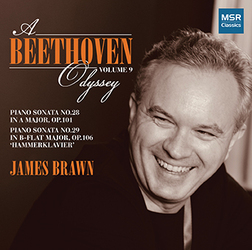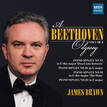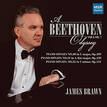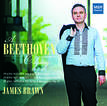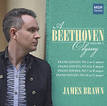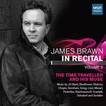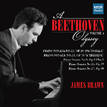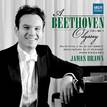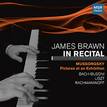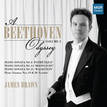|
|
JAMES BRAWN
Also Available
A BEETHOVEN ODYSSEY - VOL.9
Piano Sonatas Nos.28 & 29 "Hammerklavier"
Ludwig van Beethoven
JAMES BRAWN, piano
[ MS1473]
$14.95
REVIEWS
"This is the final disc in James Brawn’s highly successful cycle of the Beethoven piano sonatas. I have written reviews for each of the previous eight discs.., finding each of high quality. Here in Volume 9, Brawn turns in fine work once again... [In the Sonata No.28] Brawn effectively captures the poetic character of the brief first movement, its serenity and tranquillity. As usual, his dynamics and accenting are well judged and subtly applied... [in the second movement] Brawn giving the music a muscularity in his playing of the bold dissonances and nervous trills... The brief third movement...exudes the requisite tranquility and solemnity, Brawn’s broad tempo adding to the sense of quietude in the music... [The finale] brims with energy, and Brawn delineates the contrapuntal voices with his usual deft sense for clarity and proper balances... I’ve praised Brawn in previous reviews for 'his nearly unerring sense to capture the essence of the varied and often shifting moods in Beethoven’s sonatas'. That quality is clearly in evidence throughout the Hammerklavier sonata... Brawn is ebullient and stately in the opening, with plenty of thrust and power... He brings plenty of tension to the complex development section, which is full of tricky modulations and mood swings that Brawn never fails to fully enact with the utmost sensitivity and skill... The ensuing brief Scherzo is extremely effective here as Brawn imparts lots of energy to the music while capturing its sort of nervous stop and start pacing... [in the finale] Brawn presents a very sensitive and lucid account of the music... [The notes] are delineated with clarity and never lose their sense of weight and gravitas... His trills are crisp and pointed and his accenting is never immoderate but ever subtle and tasteful.... this performance...is a noteworthy success... The sound reproduction on this CD is clear and well-balanced in both works, effectively capturing the brilliant sound of Brawn’s Hamburg Steinway D, and the album notes by Jeremy Hayes are insightful and very informative... In previous reviews of this ongoing series I’ve mentioned other notable cycles of these sonatas by Vladimir Ashkenazy, Daniel Barenboim, Alfred Brendel, Rudolf Buchbinder, Richard Goode, Artur Schnabel and others. I have opined that Brawn’s performances are 'at least competitive with the better Beethoven sonata recordings and perhaps can stand with the very finest.' After hearing this final disc in the series, I must stand by that conclusion."
Robert Cummings, MusicWeb International [October 2024]
"Brawn brings a strong contrapuntal awareness to the A major Sonata's first movement... He navigates the Scherzo's difficult skips and obssesive dotted rhythms well... His Scherzo [of the Hammerklavier] has appropriate sweep and forward impetus... Brawn masterfully times the fourth movement's introductory pauses and mood shifts..."
Jed Distler, Gramophone [September 2024]
"[this is] a most worthwhile disc for the opportunity it presents to hear these two very different works in juxtaposition... Brawn is above all a thoughtful pianist, using his excellent technique not for display purposes but to color in the nuances of Beethoven’s music and present its challenges as communicative opportunities... The same approach stands Brawn in very good stead in the ever-challenging Sonata No. 29... Brawn emphasizes the foundational lyricism of the music... His ability to harness his technique, making it subservient to his view of the composer’s expressive intentions, is what shines through here, and indeed permeates his entire Beethoven cycle... [In] the very complex concluding fugue...Brawn does a fine job of allowing the contrapuntal material to show through while simultaneously emphasizing the drama and emotional heft of this extraordinary movement."
Mark J. Estren, InfoDad [July 2024]
"To say pianist James Brawn saved his best to last while completing his Beethoven 'Odyssey' with performances of the composer’s piano sonatas No.28 and No.29 might be either an under-statement or unjust. In truth, Brawn’s recordings of the sonatas have all received high praise. However, the pianist’s ninth and final recording to cap off this odyssey alone proves why his overall accomplishment deserves preservation among the legendary performances of these sonatas by renowned pianists... [Brawn brings] the composer’s sonatas anew to our ears and souls."
Joel C. Thompson, Cherry Grove Music Review [June 2023]
"[James Brawn's] performances in the multi-year series (2013-2024) have really given inspiration to younger up-and-coming artists of the keyboard!..
[The subtitle title of Sonata No. 29], 'Große Sonate für das Hammerklavier,' would make it appropriate to term it the “Great” Sonata, a name Brawn’s interpretation would seem to justify in every way... In [the] finale, polyphonic voices and quasi-fugal passages create an impressive effect, while posing hazards for an artist less capable than James Brawn!"
Phil Muse, Atlanta Audio Club [Summer 2024]
"we have reached the end of this excellent cycle. Those who have seen reviews of several earlier volumes by our colleague JJP and me will recall that we were, to say the least, favorably impressed... a few moments listening [to No.28] reassures us that Beethoven is probing more deeply, is experimenting more freely than in those previous works... At the same time, the mood here is fresh and light.Perhaps the most likely listener reaction to this work is simple joy... No. 29 (Hammerklavier) is harder to categorize. Beethoven seems to throw in everything, and the technical demands on the pianist are outrageous: the work not only may be the most difficult of Beethoven’s piano compositions but is one of the more difficult by any composer... it will come as no surprise that I am more than satisfied... As in the previous volumes in the series, there is a certain rightness about Brawn’s playing: upon listening, one is left with a feeling that yes, of course, that’s exactly the way it should be done... Given the number of Beethoven sonata cycles out there, it would be silly to proclaim one “the best” or to suppose that one set of interpretation has said everything that there is to say in such musically rich works. But Brawn’s entire odyssey is one to which I shall return often... As usual in this series, the recorded sound is excellent, with the rich tones of the Steinway D presented in all their glory... In summary, if you’re not familiar with Brawn’s Beethoven Odyssey, now would be a good time to check it out. Start anywhere and enjoy some fine performances of this wondrous music."
Bill Heck, Classical Candor [April 2024]
"[In the Hammerklavier] Brawn has a rare sensitivity to Beethoven’s apparent baldness of statement, pitching his responsiveness to a simple acceptance of the score and handling the work as a product of its time... Brawn is able to sustain your involvement through his vivid approach [of the concluding material] that gives proper value to each line in what can become some of the thickest piano writing produced by this composer. I won’t say it’s not a relief to get to the end – it always is – but Brawn carries you along with a clear mastery of form and a confident delivery that eschews flashiness and pomp for plain-speaking and (God help us) bonhomie... As for the Op. 101, the interpretation on offer has an attractive honesty, its character well established across the initial Etwas lebhaft – only a bit over a hundred bars of generally peaceful melodic arches with some unforgettably graceful, syncopated chord punctuation. Brawn is handy in implementing the empfindung that Beethoven asks for, but he has a keen eye for finding a phrase’s point – exactly where it should aspire and decline, reserving his heftiest dynamic until the climactic fulcrum at bar 86 before that lean digest of material in the last seven measures... These two sonatas provide a fine ending to Brawn’s readings of all the Beethoven sonatas. To my ears, he has given us interpretations of sincerity and security, packed with felicities that argue for a direct confrontation with the composer’s prodigious output. My generation grew up with compendiums by Kempff, Brendel, and Schnabel, encountering later complete sonatas sets from Barenboim, Pollini and Badura-Skoda. These days, pianists I’ve heard, like Fazil Say and Paul Lewis, have produced complete sets; as well, a plethora of performers I’ve not heard (or sometimes not heard of) have put forward their versions. Fortunately, Brawn is a high achiever in this company... just as pianistically gifted and insightful as his contemporaries."
Clive O'Connell, O'Connell The Music [March 2024]
“There is no doubt that Brawn is a deeply committed and intensely musical interpreter of Beethoven.”
Musical Opinion
PROGRAM NOTES
Solo sonatas were seldom played in public in Beethoven’s time; they were chamber music in the true sense, works for domestic sharing and enjoyment. Listeners to recordings and radio broadcasts today are often better off than their counterparts in the back row of a concert hall – though of course this depends on the work being played. There are piano sonatas that storm the heights, like Beethoven’s Sonata No.29, Op.106, and there are others that confide, like Sonata No.28, Op.101. The composer often complained about the limitations of the piano, proclaiming right up to his last year that, “It is and remains an inadequate instrument.” Nevertheless, the piano remained the instrument of Beethoven’s fantasy, invention and virtuosity and he used it to forge his late style, an extraordinary and compelling fusion of fugue, variation and sonata form.
James Brawn began his career at age 12 with an Australian debut in Mozart’s Piano Concerto No.25, K.503. Brawn credits subsequent achievements to the great pianists with whom he has studied, taking pride in teachers who trace their pedagogical lineage back to Beethoven, Chopin, Liszt and Clara Schumann. Born in England in 1971, his career in music began in New Zealand, where he began piano lessons at age seven. He played Bartók on New Zealand television and won his first awards in Auckland. The family moved to Australia the following year, where he studied with Margaret Schofield, Ronald Farren-Price and Rita Reichman, winning major prizes at all the Melbourne competitions and the Hephzibah Menuhin Award, presented by Yehudi Menuhin. In 1987, Brawn reached the concerto final of the ABC Young Performers Awards, which led to concerts with the Adelaide and Melbourne Symphony Orchestras. He continued private study with Rita Reichman in Philadelphia on a grant from the Australia Arts Council, and in 1988 received a full scholarship to the Royal Academy of Music in London, where he won many recital awards, including the Beethoven Prize and 20th Century Prize. At age 19, Brawn won the Keyboard Final of the Royal Over-Seas League Music Competition at the Queen Elizabeth Hall, London. From 1993-2001, Brawn taught piano and chamber music at King’s College and St. John’s College schools in Cambridge. In 2001, he returned to Australia to take up a piano teaching position at highly regarded Scotch College, where he co-founded the biennial Scotch College Piano Festival. Brawn has recorded for RTHK Radio 4 in Hong Kong, SMG Classical in Shanghai, ABC Classic FM, and 3MBS radio in Melbourne. He returned to the United Kingdom in 2010, performing regular solo recitals in London, including St. James’s Piccadilly, Blackheath Halls, Foundling Museum, The Forge, Royal Over-Seas League and St. Olave Church. Significant engagements include recitals at Chichester Cathedral, Cheltenham Town Hall, the Bösendorfer concert series at St. Mary Magdalene and the ‘Pianists of the World’ series at St. Martin-in-the-Fields. Brawn has performed in master classes with András Schiff, Tamás Vásáry, Menahem Pressler and Stephen Kovacevich, and studied chamber music with members of the Amadeus and Chilingirian Quartets. Recitals have taken him to France, Italy, China, Canada and the United States. Recent Beethoven concerto performances in the UK have been with the Surrey Mozart Players, English Symphony and Capriol Chamber Orchestras. In 2015, James Brawn was made a Steinway Artist and in 2016 he joined the piano faculty of the FaceArt Institute of Music, Shanghai.
[ www.jamesbrawn.com] PROGRAM
LUDWIG VAN BEETHOVEN
PIANO SONATA NO.28 IN A MAJOR, OP.101
[1] I. Etwas lebhaft und mit der innigsten Empfindung
[2] II. Lebhaft. Marschmässig
[3] III. Langsam und sehnsuchtvoll
[4] IV. Geschwinde, doch nicht zu sehr, und mit Entschlossenheit
PIANO SONATA NO.29 IN B-FLAT MAJOR, OP.106 “HAMMERKLAVIER”
[5] I. Allegro
[6] II. Scherzo – Assai vivace
[7] III. Adagio sostenuto
[8] IV. Largo – Allegro – Allegro risoluto
MSR Classics
|
